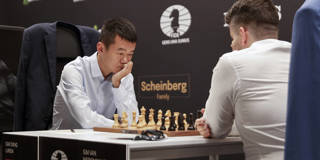The outcome of next year's world championship chess match will likely hinge as much on technological superiority as on individual human ingenuity. Should China’s Ding Liren lose, it will tell us not only something about his opponent’s character but also that Chinese supercomputing is perhaps not as advanced as we think.
CAMBRIDGE – For centuries, chess has been a metaphor for war in myth and in literature. In the next world championship match, which will take place in 2023 between Russia’s Ian Nepomniachtchi and China’s Ding Liren, the comparison may be more apt than ever, with the outcome likely to be decided as much by superiority in multipurpose supercomputing as by individual human ingenuity in chess. And while the Russian military’s dismal early performance in Ukraine hardly suggests an ability to benefit from artificial intelligence in warfare, China is the real deal on that front.

CAMBRIDGE – For centuries, chess has been a metaphor for war in myth and in literature. In the next world championship match, which will take place in 2023 between Russia’s Ian Nepomniachtchi and China’s Ding Liren, the comparison may be more apt than ever, with the outcome likely to be decided as much by superiority in multipurpose supercomputing as by individual human ingenuity in chess. And while the Russian military’s dismal early performance in Ukraine hardly suggests an ability to benefit from artificial intelligence in warfare, China is the real deal on that front.